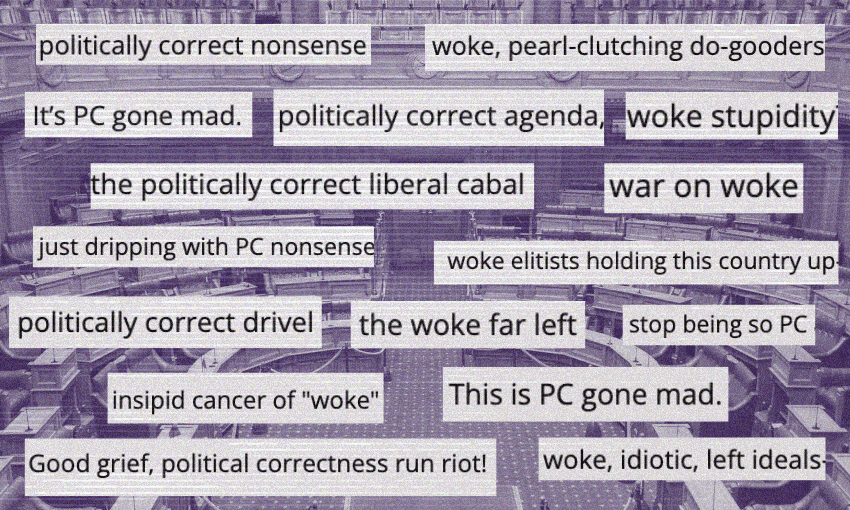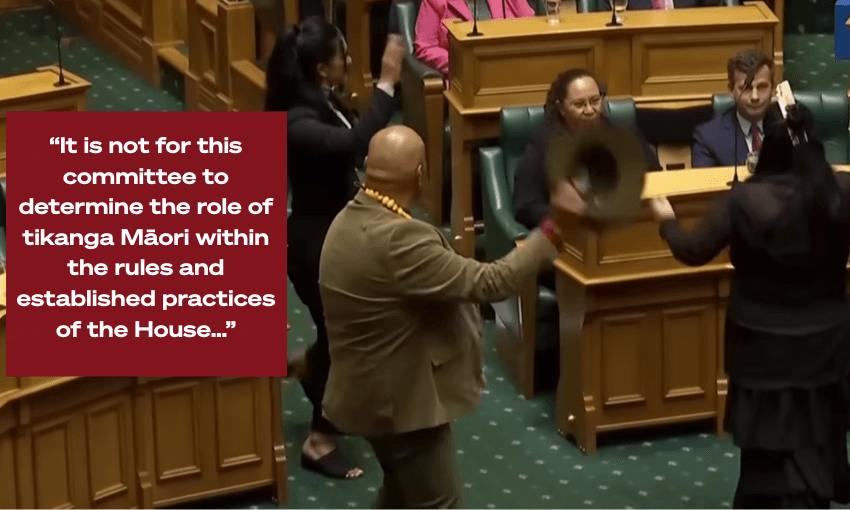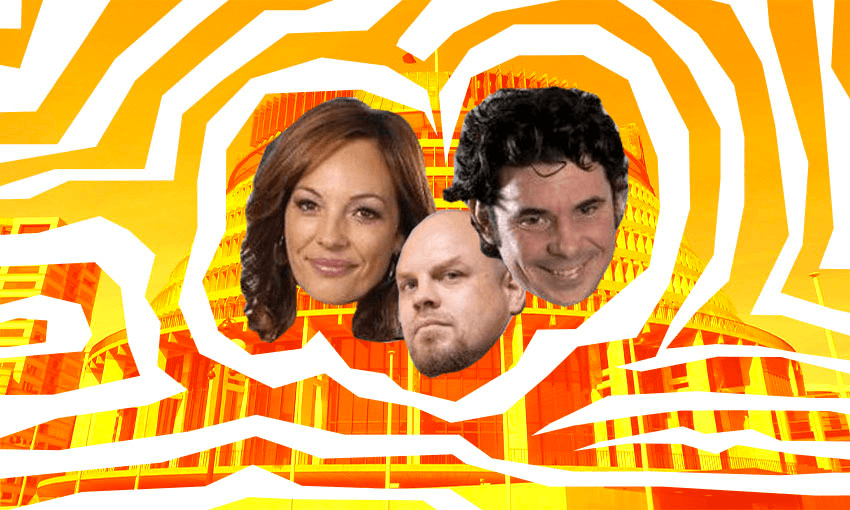A close reading of New Zealand parliamentary debates reveals when the fight against political correctness gave way to the war on woke – and the exact point the two crossed over.
These days, it’s hard to imagine Winston Peters without the amorphous enemy of wokeism to rail against. But a couple of decades ago, that nemesis went by a different name: political correctness. “The government has inflicted this country with an epidemic of political correctness, which has created men out of women and women out of men,” he said in parliament on December 10, 2003. “We want to end the politically correct nonsense that has surrounded the Treaty, and it will take heroes to do it,” was the line on May 17, 2007. Plus ça change.
Political correctness (AKA PC) and wokeism (AKA wokeness or wokery) aren’t entirely interchangeable, but the two concepts have much in common. Both started out as positive or neutral terms, but came to be used almost exclusively in a pejorative sense. Both are slippery and malleable: they can be moulded to the culture war issue du jour and essentially mean anything the user wants them to. Some commentators reckon wokeism is broader than PC, as PC is focused on language – “the avoidance of language or behaviour that could be seen as excluding, marginalising or insulting to groups of people disadvantaged or discriminated against”, as Wikipedia puts it.
I’m not so sure about that, because PC is much broader than just language, invoked in reference to everything from overly cautious health and safety rules (see Prince Charles on conkers) to, y’know, criticism of white people donning blackface. One commentator has defined them both as “an aggressively performative focus on social justice”, which is at least brief.
The rise of PC
The term political correctness as we know it emerged in the mid-80s – this Aussie social work lecturer at Victoria University was an early adopter – but didn’t enter the mainstream consciousness in New Zealand until the 90s, ascending slowly but surely until it was absolutely everywhere by the turn of the millennium. With Helen Clark’s government securing a second term in 2002, the war against PC hit its stride: National’s shadow education minister Nick Smith was railing against the “political correctness gone mad” of kapa haka being recognised in the NCEA, and for the next few years “PC gone mad” went a bit, well, mad.
According to Hansard, there were 250 mentions of “politically correct”, 139 mentions of “political correctness” and 82 for “PC” during parliamentary debates in the 2002-2005 term, which is as far back as online Hansard goes. (It’s possible, I concede, that some of those 82 PCs were referencing the family computer.) “Politically correct nonsense” was a phrase uttered 18 times and “PC nonsense” 19 times during those three years, mainly, it would seem, by Nick Smith (social workers being required to learn about the Treaty, councils consulting with iwi, kava ceremonies for public servants, resource management reform and changes to the law around guardianship arrangements for kids were just a handful of his targets).
Another heavy user was National MP Brian Connell, who, debating a bill that would ban smoking in pubs in August 2003, said it was “PC gone mad” that “ex-soldiers of this country, people who have given their all for it, cannot light up a fag at the local Returned Services Association club”. (You don’t hear ciggies being called fags much these days – PC gone mad etc.) Connell had quite the way with words, the following year coming out with: “This week, our wishy-washy, chardonnay-sipping, insipid, mealy-mouthed, PC government has been absolutely pathetic on crime.”
The fight against PC jumps the shark
It’s safe to say that 2005 was the year we reached peak PC. When National leader Don Brash appointed Wayne Mapp as “political correctness eradicator”, a move that was widely mocked, the war against political correctness jumped the shark. Within a year or so, the aforementioned anti-PC crusader Connell had gone rogue and been eradicated from the National caucus after confronting Brash about an extramarital affair (surely such a moralistic concern is, in fact, PC gone mad?) Brash was soon after ousted as party leader by a young upstart by the name of John Key, who ditched the “PC eradicator” role, labelling it a sideshow, and went on to become one of New Zealand’s most popular prime ministers.
Political correctness, or the crusade against it, at least, persisted, but it was nothing like those heady days of the 47th New Zealand parliament. During the 2005-2008 term, the phrases “politically correct nonsense” and “PC nonsense” were uttered only five times in the House (thrice by Judith Collins), down from 37 the previous term. In the 2008-2011 term, there were more instances of Labour MPs referencing political correctness ironically than genuine cries of anti-PC anguish from the centre right, and by the 2011-2014 term these phrases had all but petered out.
During the 2014-2017 term, in the midst of which the fight against political correctness was enjoying a renaissance abroad thanks to one particular US presidential candidate, only members of the New Zealand First party were brave enough to say it in our halls of power, and by 2017-2020 it was basically just Nick Smith who wasn’t ready to let go. In the current term, there is yet to be a single mention of PC, politically correct or political correctness during parliamentary debates.
The new era of woke
In the dying days of the 2017-2020 parliamentary term, a crossover occurred. Like ships passing in the night, woke and PC came together for one beautiful, fleeting moment. The occasion was the valedictory statement of NZ First MP Clayton Mitchell, just before his party was turfed from parliament, in July 2020: “I’ve got a reputation for not putting up with the woke brigade’s politically correct BS,” he said.
Mitchell wasn’t the first MP to say “woke” in parliament; he wasn’t even the first to say “woke” and PC/politically correct in the same sentence. That was Simon Bridges the year prior, but as Bridges’ comment was somewhat tongue in cheek (he referred to one law as the “poor cousin” of another, adding, “I’m not sure it’s politically correct to say this any more – certainly not woke”), the definitive crossover moment has to be Mitchell’s valedictory. Bridges does get the honour of New Zealand parliament’s first use of “woke” in the relevant context, however: on September 10, 2019, the then National leader referred to some “woke young things on Twitter”.
The 2020 election saw NZ First ousted from parliament, and by June 2021 Nick Smith had bid farewell to the beltway too, leaving precious few warriors to pursue the war on PC. There were just five references in the 2020-2023 term, none of which were particularly pejorative.
Wokeism, though, was slowly gaining ground. Due to a frustrating prevalence of MPs using woke in its literal sense to describe the act of rousing oneself from slumber, The Spinoff is not able to confidently provide a woke tally for this term, but can confirm that both Simon Bridges and Judith Collins gave it a hoon. Simeon Brown took up the fight too, referencing Chlӧe Swarbrick’s “woke rage” and various instances of “woke virtue signalling”.
It was Act MPs who really embraced woke, however. Simon Court spoke of the government’s “woke climate dogma”, but mostly education was the focus, with James McDowall referencing the “growing phenomenon of woke cancel culture in places of learning” and Chris Baillie talking about teachers “hung up in their own world of woke conformity and self-righteousness”, promising that “the woke agendas that are causing so much harm to our kids will end”.
Fast forward to the current parliamentary term and Act MPs have been positively restrained by comparison – Simon Court referencing the Greens and their “woke mates” in the Labour Party here, Todd Stephenson saying “we’ve got to stop this woke madness” there – but another party has stepped in to fill the gap. No prizes for guessing which: New Zealand First, of course, whose leader has invoked woke or wokeism in the House no fewer than 19 times during this parliamentary term. “New Zealanders are sick of this insipid cancer of “woke” that has crept into our society,” he said in typically understated fashion on April 2, 2025. “New Zealand First declared a war on woke and we are on the front line of it,” Peters continued. “We will not put up with your bulldust any longer! I got news for you, and it’s all bad.” Shane Jones has managed just seven wokes, usually opting for the compound adjective “woke-riddled”.
When will woke peak? Will 2026 be the war-on-woke election? No one knows for sure, but as opposition MPs are already using it ironically – something that marked the beginning of the end for PC – the decline may have already begun. When Winston Peters appoints Shane Jones as wokeism eradicator, we’ll know for sure it’s all over.






